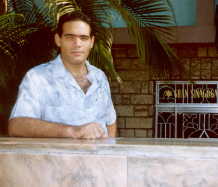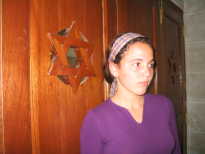|
María Luisa
Zayón and Pável Tenenbaum
are President and Past-President, respectively, of the Jewish
Cuban Youth Group which has taken the name of "Maccabi
Cuba." "But we are more than a sports club,"
says María
Luisa, who is called "Malu" by her friends. "We
took the name to keep tradition, to associate with a well-known
organization."
Malu and
Pável serve as co-leaders of the group, appointed by a board
of advisors. Both served as counselors before their appointments,
which they considered to be good training for the responsibilities
they have now. Malu, a journalism student at the University
of Havana, and Pável, who has a degree in economics from the
same university, speak enthusiastically about the group and
its activities.
"The
group has changed over the years," says Malu. "Now
they are more interested in religious services than they were
in the past." With support from the Joint Distribution
Committee (JDC) the group has lectures on Judaism provided for
them, with a Saturday night course available which covers history,
holidays, and other topics related to Jewish life.
"The
group celebrates all the holidays," says Pável. "And
we also are involved in many projects which help the community."
Some of
these projects include the Health Assistance Program, providing
medical assistance to members of the congregation when needed.
"If the people can't come to the Patronato (Havana's Jewish
Community Center) then we go out to them," says Pável.
Assistance is offered through the provision of such items as
medicine, disposable sheets, and clothing.
Other projects
include the annual JDC camp, which brings in Jewish participants
from all over Cuba to a rustic location for activities and study.
"There
are around 150 young people involved," says Malu. "And
they help with all the activities of the community center and
with the other congregations around the country." Each
community has counselors, she says, who help with the programs
in most of Cuba's thirteen Jewish communities. "The counselor's
group trains new leaders, and in turn they train others, so
we are always training new people to take responsibility."
 "And
the responsibility grows each year," adds Pável. "For
example, we help the community and other groups such as B'nai
B'rith with things like home repair, and we help in activities
around the synagogue." "And
the responsibility grows each year," adds Pável. "For
example, we help the community and other groups such as B'nai
B'rith with things like home repair, and we help in activities
around the synagogue."
There is
also a small committed group within the larger group named "kesher"
("together" or "contact") associated with
the youth group, which brings young people together in an informal
setting, and also helps families and seniors.
Pável is
now working with the Patronato as an administrative assistant,
helping to organize events, conduct tours for visitors, help
with supplying the pharmacy, organizing the library, and helping
out on the various tasks that come up each day. He hopes to
eventually get a computer so he can set up a database for the
library's ten thousand books, and also create a list with information
on the congregation's members.
Malu continues
her journalism studies at the University of Havana, with an
emphasis on cultural journalism. She has particpated in the
"Birthright" program, which enabled her to visit Israel.
"There were ten of us on the trip," she says. "It
was one of the most exciting times of my life."
The Jewish
youth group in Cuba has not always been strong. With the departure
of over 90 percent of the Jewish populartion after 1959, the
restrictions on religious practice until 1991, and the recent
departure of several hundred individuals and families to Israel,
the youth group struggled to keep going with just a few individuals.
"But
now we're getting stronger," says Malu. "Nestor
and Mara (assigned to Cuba by the JDC) have helped tremendously.
The most important thing is now we have a youth organization.
There are more coming in. Now they have a place to go."
"And
there's more exchange with the outside world," adds Pável.
"We don't feel so isolated anymore."
Article
by Richard Smith
March 2004
|

